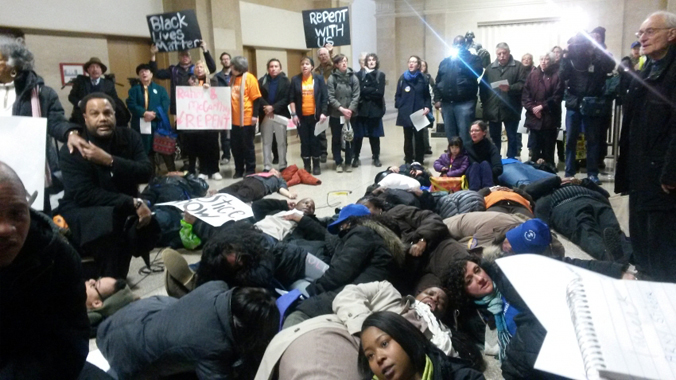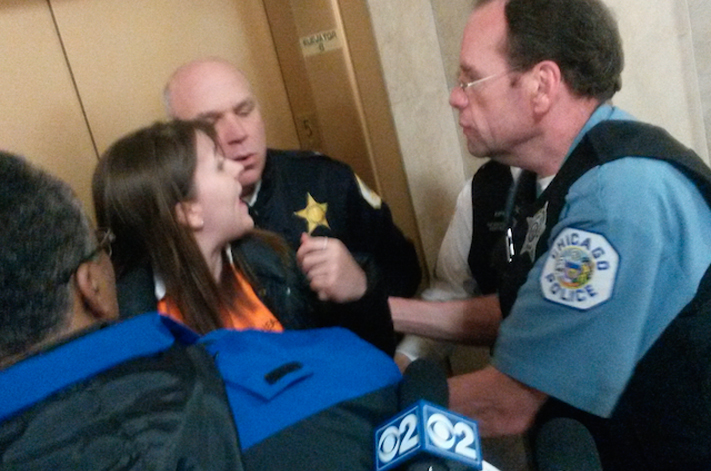“To This Mayor [Rahm], Black and Brown Lives Do Not Matter”

By Yana Kunichoff | Originally Published at In These Times. March 24, 2015
Protesters demand reforms to alleged abuses in Chicago’s criminal justice system, including a discriminatory “stop-and-frisk” program and secret interrogation site.
A chaotic scene played out on the fifth floor of Chicago’s City Hall Tuesday morning. In one corner, clergy members argued fervently with police officers amid a scrum of journalists to be allowed in to Mayor Rahm Emanuel’s office to present their demands on police accountability.
Behind them, dozens of protesters looked on as 30-some activists lay on the floor in a die-in—a protest action that’s become a mainstay of the Black Lives Matter movement—belting out “We Shall Overcome.” And behind the rope separating Emanuel’s office from the protest, a slowly growing number of police officers trickled in to stand between the clergy and their eventual target: the door leading to the mayor’s office.
“We just want to talk to the mayor,” came the entreaty from the negotiating clergy.
In the end, it took three arrests and nearly an hour of testimonials and consultations before four clergy members were allowed past the rope barrier to present their demands to a member of Emanuel’s staff. The protest—led by the Community Renewal Society, a religious-based social justice organization—was the latest in a series of actions aimed at pressuring Emanuel to address alleged police abuses that have come to dog his campaign for reelection ahead of the April 7 run-off.

Chicago police grab a protester on City Hall’s fifth floor, just outside Mayor Rahm Emanuel’s office. (Yana Kunichoff)
The day before the protest, the American Civil Liberties Union released a report showing that Chicago police stopped more than 250,000 people last summer for questioning without making any arrests—a policy that closely mirrors the “stop and frisk” program in New York City that came under heavy scrutiny before being scaled back by Mayor Bill de Blasio. And allegations that the Chicago Police Department ran an interrogation center where suspects were held without being officially booked—essentially keeping them “off the books”—have made international headlines.
The demands of the protesters that stormed City Hall on Tuesday touched on police issues across the board with three key demands: reforming the body camera pilot program, creating independent citizen oversight in place of the mayor-appointed entity currently in place, and ending stop and frisk.
“We have asked the mayor since December to meet with us and discuss police brutality, but [his office] still did not respond at all,” said Charles Anderson, an activist with CRS. “We are back because to this mayor, black and brown lives do not matter. He does not care, and he has not made any effort to show us that he cares.”
The effects of harsh policing policies fall disproportionately on Chicago’s African-American population. While only about 33 percent of the city’s population is African-American, the ACLU report found that72 percent of people stopped on the street by the CPD were black. That percentage falls particularly hard on youth—Chicago-based advocacy and research organization Project NIA’s Arresting Justice report found that 79 percent of youth under the age of 18 arrested in 2012 were African-American.
'We are back because to this mayor, black and brown lives do not matter. He does not care, and he has not made any effort to show us that he cares.'
The group is also demanding that the city do away with the Independent Police Review Authority, the mayor-appointed body charged with overseeing complaints against police. IPRA can make suggestions for action against a police officer but has no power to carry out any discipline. In 2014, IPRA sustained 6.42 percent of allegations leveled against police officers. CRS wants IPRA to not only have disciplinary powers, but to change the investigative process to create what they call “real accountability.”
Police accountability has become a key issue in Chicago’s current mayoral election. Jesus “Chuy” Garcia, empathyeducates – “To This Mayor [Rahm], Black and Brown Lives Do Not Matter”:
